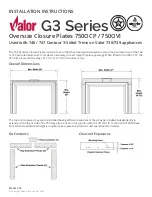
21
The duct system must be installed respecting the following :
1.
Remove the plates closing up the 8" dia. holes on top of the fireplace. Then, cut the insulation
in order to obtain two 8" dia. openings. Fix the adaptors on the fireplace openings by turning
clockwise (figures 14 and 15).
2.
Maintain at least a 2" (50mm) clearance between the ducts and any combustible material; the
required hole size is 13" x 13" (330 mm x 330 mm).
Exception #1:
For the grills, the framing can be 10 ¾" x 10 ¾" (275 mm x 275 mm) to provide the clearance
as required by the integral spacers on the double outlet duct system.
Exception #2:
For the single outlet, the framing must be 8 ¼" x 32 ¼" (210 mm x 820 mm) or as required by
the integrated spacers. At no time should any combustible facing material such as panelling cover over any part
of the grill face.
3.
The maximum number of elbows in a run of duct is two.
4.
Maintain at least 6 ½ " (160 mm) clearance from the outlet grill framing to a combustible
ceiling, side wall or mantel.
5.
When traversing a combustible wall or floor, a firestop must be installed at the wall or floor
penetration. The hole size must be 13" X 13". (330 mm x 330 mm)
6.
Do not connect the hot air ducts to a central heating system. Malfunction of the heating system’s fan will cause the
fireplace to overheat. Furnace duct is only single wall and not double wall as is required for the BIS ULTRA hot
air exhaust. For this type of installation refer to
« Central forced air kit »
, next page.
7.
Use only Security Chimneys International grills and components as described in this manual. Other grills or
registers, for example, may be too restrictive and may overheat the fireplace or ceiling.
8.
Do not use insulated flexible ducts as they will overheat.
9.
Do not use tees or any other components than the ones specifically listed here.
10.
All ducts must extend upwards or horizontally. Never try to route the ducting downwards.
11.
The hot air outlet grills must be installed with the louvers pointing downwards in order to prevent overheating
adjacent ceilings.
















































